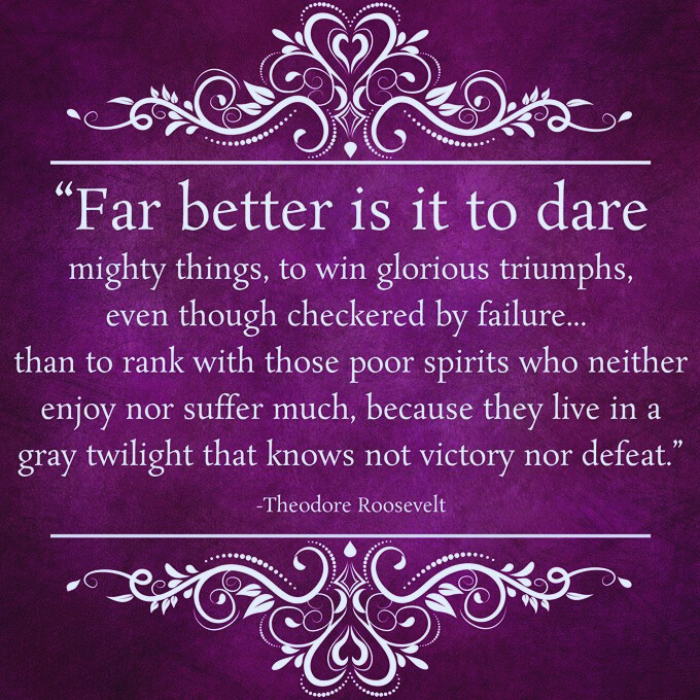
The Essence of Daring
Theodore Roosevelt’s words resonate with a timeless truth: the value of daring to strive for greatness. This powerful quote encapsulates the essence of human ambition and the courage to face failure. It stands as a call to arms against the complacency of what Roosevelt called the “gray twilight” of life—that place where nothing is risked and nothing truly gained.
Roosevelt lived by these words. His life, filled with both remarkable triumphs and significant setbacks, serves as a testament to this philosophy of bold action and resilient spirit.
The Remarkable Life of Theodore Roosevelt
Theodore Roosevelt (1858-1919), the 26th President of the United States, was a figure of extraordinary significance in American history. Known for his vibrant personality, diverse interests, and progressive policies, his life and work left an indelible mark on the United States.
From Sickly Child to Vigorous Leader
Born on October 27, 1858, in New York City, Roosevelt began life as a frail child suffering from debilitating asthma. Rather than accepting these limitations, he embarked on a rigorous exercise regime, transforming himself through sheer determination. This personal victory foreshadowed the vigorous lifestyle and indomitable will he would demonstrate throughout his life.
Homeschooled due to his health issues, young Roosevelt developed a profound love for nature and wildlife—interests that would later shape his revolutionary conservation efforts as president.
Education and Early Political Career
After graduating from Harvard in 1880, where he excelled in science, philosophy, and history, Roosevelt briefly attended Columbia Law School before turning to politics. His political journey began in the New York State Assembly (1882-1884), where he distinguished himself by fighting corruption and advocating for civil service reform.
When personal tragedy struck in 1884—the deaths of both his mother and first wife on the same day—Roosevelt retreated to the Dakota Territory. There, he lived as a rancher and sheriff, experiences that would profoundly shape his character and conservation ethics.
Rise to National Prominence
Roosevelt’s return to political life saw him serve as Civil Service Commissioner, President of the New York City Police Board, and Assistant Secretary of the Navy. His national fame soared during the Spanish-American War, when he led the Rough Riders in the famous charge up San Juan Hill. This heroic image propelled him to the governorship of New York in 1898.
A Transformative Presidency
In 1900, Roosevelt was elected Vice President under William McKinley. McKinley’s assassination in 1901 thrust Roosevelt into the presidency at age 42—making him the youngest president in American history.
As President, Roosevelt was a dynamic force for reform. His “Square Deal” domestic policies aimed to balance the interests of business, consumers, and labor. He broke up monopolistic trusts, regulated railroads, and championed food and drug safety legislation.
Conservation Pioneer
Perhaps Roosevelt’s most enduring legacy is his revolutionary conservation work. An ardent naturalist, he established the United States Forest Service, created national parks, monuments, and wildlife refuges, and placed approximately 230 million acres of land under public protection—laying the foundation for America’s conservation movement.
Global Statesman
In foreign policy, Roosevelt practiced what he called “speaking softly and carrying a big stick.” He orchestrated the construction of the Panama Canal and won the Nobel Peace Prize in 1906 for mediating the Russo-Japanese War—becoming the first American to win a Nobel Prize.
Living a Life of Bold Action
Roosevelt’s philosophy challenges us to embrace action over inaction, to risk failure in pursuit of success, and to live a life rich with the full spectrum of human experience. His face on Mount Rushmore alongside Washington, Jefferson, and Lincoln stands as a testament to his extraordinary impact on American history.
Daily Affirmation
“I choose action over inaction. I embrace the possibility of failure in the pursuit of success, and choose to live a life colored with the full range of human emotions and experiences.”
Additional Inspirational Quotes on Courage and Perseverance
- “Success is not final, failure is not fatal: It is the courage to continue that counts.” — Winston Churchill
- “The only limit to our realization of tomorrow will be our doubts of today.” — Franklin D. Roosevelt
- “It is hard to fail, but it is worse never to have tried to succeed.” — Theodore Roosevelt
- “Only those who dare to fail greatly can ever achieve greatly.” — Robert F. Kennedy
- “Do one thing every day that scares you.” — Eleanor Roosevelt